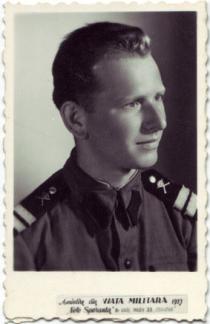Saul Rotariu
This is me, Saul Rotariu, this is how I looked in 2005.
My modernist, present-day story has nothing special about it. I graduated from high school in 1955. After graduation, I worked for two years as an accountant in Saveni, at an agricultural machine and tractor station. My father worked there as an accountant as well and, since he worked there, I ended up working there as well. Two years later I was drafted into the army. After completing my military service I attended university. I went to college in Iasi, under the optional attendance system, for four years. I worked for and studied at the Faculty of Accounting simultaneously. I worked in Saveni and then moved to Botosani in 1961. I've been working here ever since.
I am an economist by trade, I worked as an economist in various industrial units. I worked for a commercial unit for selling food products, after which I was head accountant for an industrial unit for collecting raw material for the light industry. I worked there until 1998, and from 1998 I worked for the Public Finances Division, I was a specialty inspector until 1999. I retired in 1999 and I am now a young pensioner aged 69.
I attend the service at the synagogue every Saturday. Now that I am retired, I go more often than I used to when I was working - I didn't even have the time then. During communism, you could practice your religion without restraints. It was only that you had to be at work, even if it was a holiday. But in certain cases, whenever possible, if they were willing to give you one or two days off, you took a leave for one or two days. It also depended on where you worked. If you worked in a highly politicized institution, you couldn't tell them: 'Give me a day off, I have business to attend to at the synagogue' - for such was politics, it was atheistic. But, in general, you could observe the holidays if you wanted. You took a leave of absence and you had a week or two for Yom Kippur and Rosh Hashanah. Furthermore, you could go to the synagogue, nobody asked anything about that. If you held a high-ranking position in the political hierarchy, well then, that was a different matter: you had agreed to get involved in that, you had to take the consequences.


















